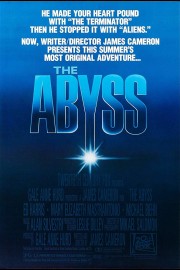The Abyss
For this review, I decided to watch the theatrical version of James Cameron’s “The Abyss,” even though his nearly three-hour Special Edition is supposedly better. I will check that out at some point, but the theatrical version is a terrific sci-fi drama that has some of Cameron’s strongest storytelling.
The film begins with a US nuclear submarine, the Montana, is on a routine patrol when it has an encounter with a submerged object that it couldn’t identify, and sinks near the Cayman Trough. In a race against Soviet ships to salvage through the ship, a SEAL team is sent to an experimental drilling platform beneath the surface of the ocean, the Deep Core. The team is taken to the platform by Dr. Lindsey Brigman (Mary Elizabeth Mastrantonio), whose estranged husband, “Bud” (Ed Harris), is the foreman on it. Apart from their own, awkward past, they find a SEAL team with an agenda on its own, and unexpected visitors from the deep, is going to complicate what should be a simple retrieval mission.
James Cameron’s love for exploration underneath the ocean begins here, and it’s a fascination that led him to “Titanic” and two big-screen documentaries, “Ghosts of the Abyss” and “Aliens of the Deep,” and- reportedly- will be a part of at least one of the upcoming “Avatar” sequels. I think “The Abyss” is my favorite of these projects, because it not only is one of Cameron’s best scripts, in how he shapes the characters, the dynamics between them, and brings sci-fi ideas into what would work as a successful character drama on its own. Yes, the documentaries are fascinating to watch, and “Titanic” is probably his most technically masterful film, but “The Abyss” is a wonderful look at genre impeding on real life, and bringing something out of the characters we don’t expect when the movie begins. To a certain extent, it may end up becoming my favorite James Cameron movie- not overly overwhelmed with technical wizardry that supersedes the story, and the emotions are in the right place.
There are many different story threads at work here, and the impressive thing is how well Cameron serves all of them. The primary one focuses on Lindsey and Bud, the reunion of this couple who hasn’t been a couple, and the emotions that are brought up not just by the close proximity with which they have to work together, but the dramatic events that put them in a life-and-death situation; each one has a moment where it appears they might lose the other, and the performances by Harris and Mastrantonio are as good as any in a drama made for Oscars, and top level for an adventure film. The shoot was miserable for all involved- something Cameron seems to excel in- but the director knows how to make that type of situation turn to his advantage, and come out with something that connects with audiences. That’s not the only piece of storytelling going on, though- the tensions of the Cold War permeate through the film, with the SEAL team’s determination to not only beat the Russians, but to take out any threat they find; when that seems to include aliens in the deep, the paranoia starts to get the better of the team, with Lt. Coffey (played by Cameron favorite Michael Biehn in a great performance) being affected the most, making the situation even harder for the people in the Deep Core, although it will eventually lead to a moment of discovery is as striking as any sequence Cameron has ever crafted.
James Cameron may be a pain in the ass to work with, but his perfection has given us a career of remarkable images that are as groundbreaking as anything we’ve seen from George Lucas, Peter Jackson, Stanley Kubrick or Orson Welles. He was one of the key individuals to use CGI in bringing his visions to life, and it played a big role in some of the most memorable moments in “The Abyss,” when the film becomes a science fiction adventure on top of a military drama. This was his third feature after taking over on “Piranha 2,” after “The Terminator” and “Aliens,” and his early career is one of the great stretches of filmmaking anyone has had, and it remains the best part of his career, because he was working on a smaller scale, but still ambitious in his vision. In later works, the story seems to be overtaken by the technology; “The Abyss” doesn’t allow that to happen, and it’s a great piece of cinema, as a result.










